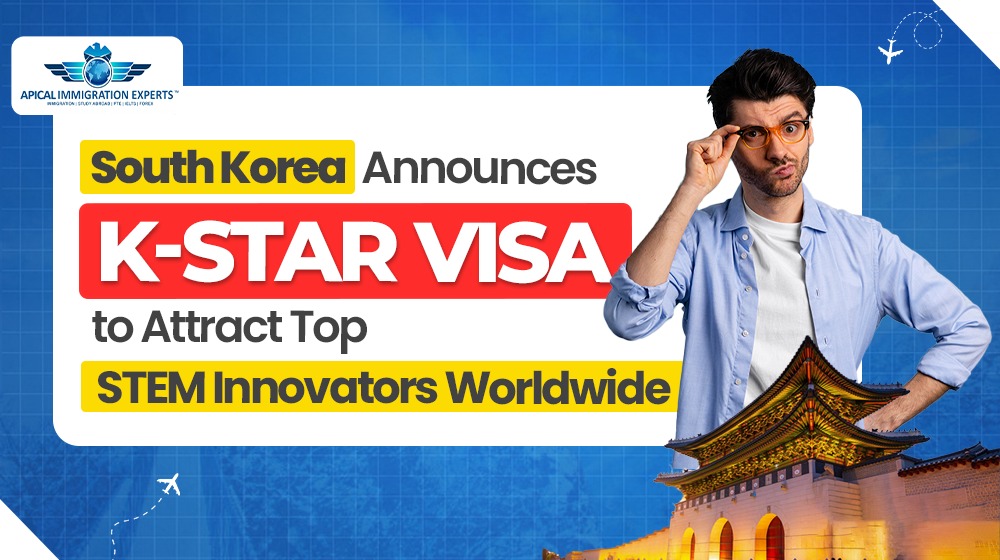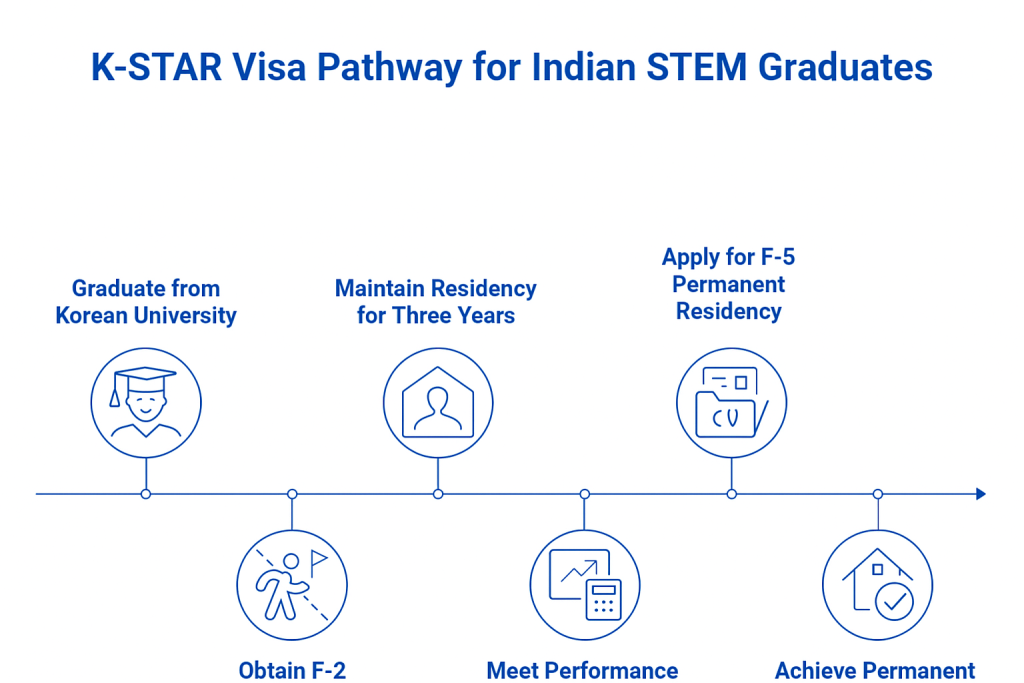
South Korea Announces K-STAR Visa to Attract Top STEM Innovators Worldwide
- South Korea has unveiled the K-STAR Visa to draw exceptional international talent in Science, Technology, Engineering, and Mathematics (STEM).
- The initiative targets over 400 global professionals every year, emphasizing expertise in Artificial Intelligence (AI), biotechnology, and advanced engineering.
- It provides a fast-track route from F-2 residency to F-5 permanent residency and eventual citizenship.
- The program partners with leading Korean universities, allowing direct nominations of outstanding international graduates.
- Following a successful pilot phase in 2023, the nationwide rollout is planned for 2026.
A Game-Changing Pathway for Global STEM Professionals
South Korea’s Ministry of Justice has introduced the K-STAR Visa Program to attract leading scientists, engineers, and innovators from around the world. This strategic initiative is designed to enhance the nation’s technological competitiveness and innovation ecosystem.
The K-STAR Visa offers an efficient immigration pathway, enabling eligible foreign professionals to seamlessly transition from temporary residence to long-term settlement. With a strong focus on research-driven growth, the program aims to make South Korea a global magnet for innovation.
Developed in close collaboration with the country’s top universities and research institutes, the initiative empowers university presidents to recommend exceptional international graduates — especially those completing Master’s or Ph.D. degrees in STEM fields.
Looking for expert immigration guidance? Connect with Apical Immigration Experts — your trusted partner for overseas careers, study abroad, and PR solutions.
K-STAR Visa: A Golden Opportunity for Indian STEM Graduates
For Indian students and professionals aspiring to advance their careers abroad, the K-STAR Visa opens an exciting new gateway into South Korea’s fast-growing tech and research ecosystem.
Graduates from participating Korean universities can directly transition to an F-2 residency visa upon completing their postgraduate studies — without requiring an employment offer. After maintaining residency and meeting research performance standards for three years, they become eligible for F-5 permanent residency, paving the way for citizenship.

Key Advantages for Indian Applicants:
- Direct F-2 residency after graduation, no job offers required.
- Eligibility for permanent residency within three years.
- Access to Korea’s top research centers in high-tech sectors.
- Collaboration with global innovation leaders in AI, robotics, and biotechnology.
- Long-term stability through a clear residency-to-citizenship pathway.
Strengthening Korea’s Global Innovation Leadership
The introduction of the K-STAR Visa aligns with South Korea’s vision to transform into a global innovation hub. Beyond simply attracting talent, the government is building a sustainable ecosystem that fosters collaboration between academia, research, and industry.
The Ministry of Justice plans to establish dedicated support channels, orientation programs, and industry–university partnerships to ensure that foreign professionals integrate smoothly into Korea’s workforce.
By connecting global STEM expertise with Korea’s booming technology sectors, this initiative addresses skill shortages, strengthens R&D capacity, and reinforces South Korea’s commitment to global collaboration and technological advancement.
FAQs: South Korea’s K-STAR Visa Program
What is the K-STAR Visa?
The K-STAR (Korea Science & Technology Advanced Human Resources) Visa is a new visa pathway created to attract global STEM talent. It enables qualified professionals, researchers, and graduates to live, work, and settle in South Korea with a direct path to permanent residency and citizenship.
Who can apply?
Eligible applicants include international students, researchers, and professionals with advanced degrees (Master’s, Ph.D., or postdoctoral) in STEM disciplines from designated Korean universities.
What sectors does it cover?
The visa targets high-demand areas such as AI, biotechnology, robotics, data science, and advanced engineering.
What are the key benefits?
Immediate F-2 residency, eligibility for F-5 permanent residency within three years, access to top research institutions, and long-term settlement opportunities.
How is it different from other Korean work visas?
Unlike traditional work visas that require employer sponsorship, the K-STAR Visa is education- and research-based, focusing on individual merit and academic performance.
When will it be available?
The visa is currently in its pilot stage and will be fully implemented by 2026 across major Korean universities.
Conclusion
With the K-STAR Visa, South Korea is setting new benchmarks in global talent mobility and research-driven immigration. The program not only supports the country’s high-tech industries but also empowers global professionals — especially from India — to contribute to the next wave of scientific and technological breakthroughs.
Want to explore South Korea’s new K-STAR Visa pathway?
Contact Apical Immigration Experts for personalized visa guidance, eligibility assessment, and step-by-step support for studying, working, or settling abroad.
- Email: info@immigrationxperts.com
- Call us: +91-9999467686, +91-8447-696555





